Destination Management Report: Marketing Strategies and Campaigns
VerifiedAdded on 2019/12/03
|26
|9077
|232
Report
AI Summary
This report delves into the multifaceted aspects of destination management, examining policy, planning, and promotional strategies within the context of the tourism industry. It begins by critically evaluating the existing literature and theories related to destination marketing, image creation, and branding, highlighting the complex nature of destination management and the need for regular re-imaging. The report then assesses the factors impacting destination management, including the challenges faced by marketers in developing city marketing strategies and evaluating the effectiveness of different destination marketing models. It also explores the application of tools necessary for developing destination marketing strategies, including the main elements of a strategy and the components of a marketing campaign. Furthermore, the report critically synthesizes macro-environmental issues, such as globalization and international tourism, to develop a contextual approach to destination management and marketing. It also compares and contrasts international and domestic destination marketing campaigns, examines different perceptions of international versus domestic visitors, and assesses the challenges of multilevel city marketing for tourism. Finally, the report applies and evaluates appropriate destination marketing and management strategies for cities at different stages of development, considering communication campaigns for cities with varying attractions and the creation of images and brands for cities undergoing regeneration.
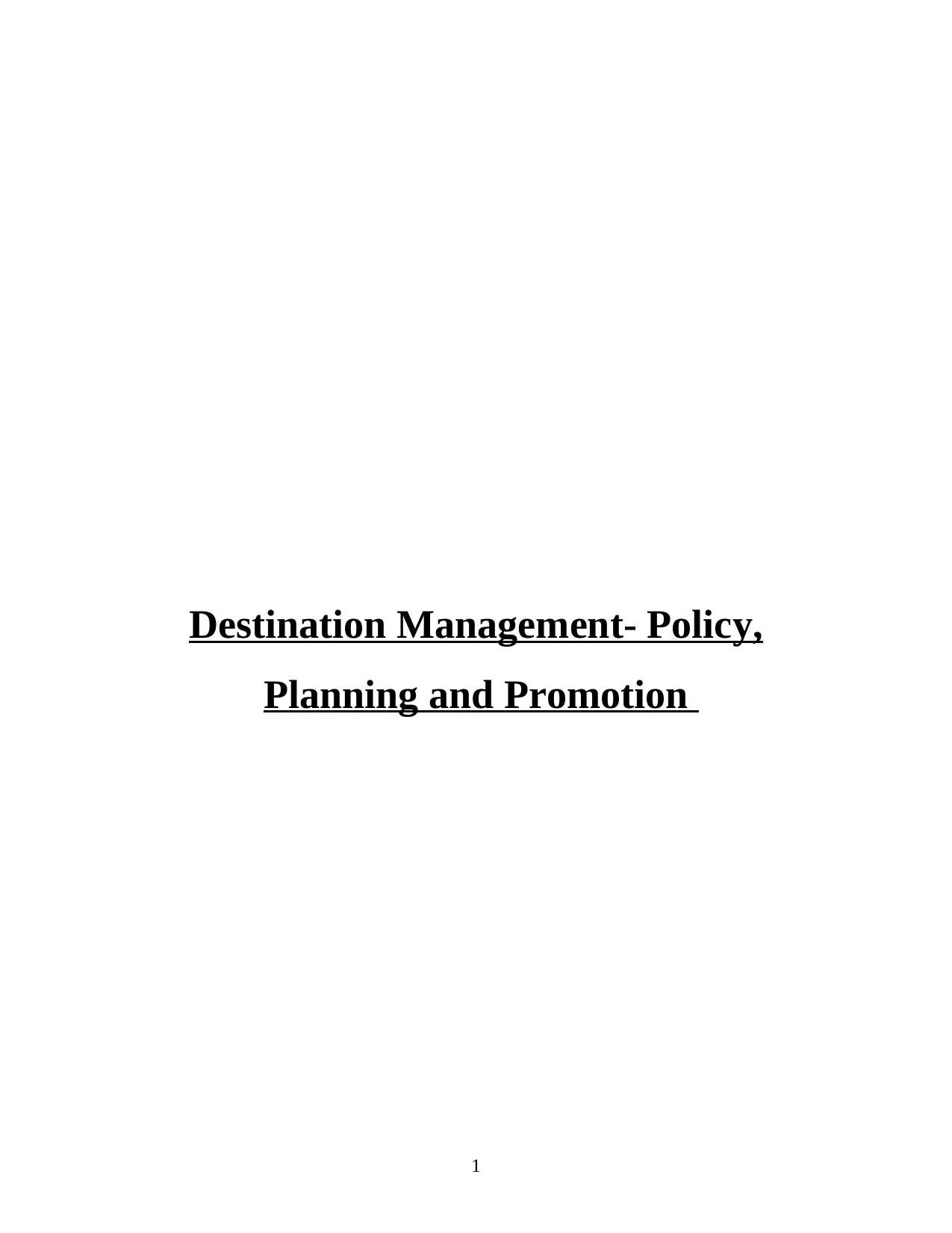
Destination Management- Policy,
Planning and Promotion
1
Planning and Promotion
1
Paraphrase This Document
Need a fresh take? Get an instant paraphrase of this document with our AI Paraphraser
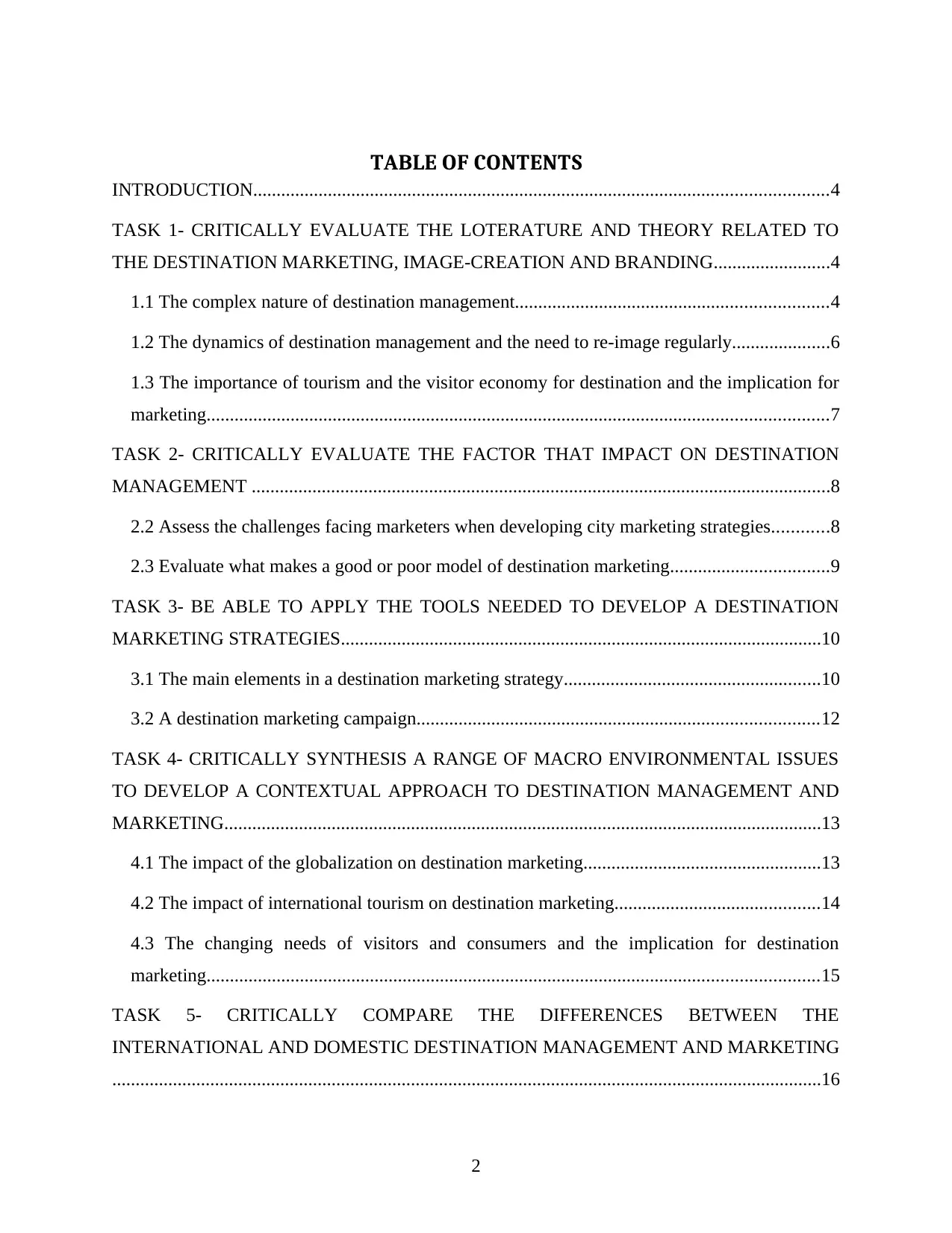
TABLE OF CONTENTS
INTRODUCTION...........................................................................................................................4
TASK 1- CRITICALLY EVALUATE THE LOTERATURE AND THEORY RELATED TO
THE DESTINATION MARKETING, IMAGE-CREATION AND BRANDING.........................4
1.1 The complex nature of destination management...................................................................4
1.2 The dynamics of destination management and the need to re-image regularly.....................6
1.3 The importance of tourism and the visitor economy for destination and the implication for
marketing.....................................................................................................................................7
TASK 2- CRITICALLY EVALUATE THE FACTOR THAT IMPACT ON DESTINATION
MANAGEMENT ............................................................................................................................8
2.2 Assess the challenges facing marketers when developing city marketing strategies............8
2.3 Evaluate what makes a good or poor model of destination marketing..................................9
TASK 3- BE ABLE TO APPLY THE TOOLS NEEDED TO DEVELOP A DESTINATION
MARKETING STRATEGIES.......................................................................................................10
3.1 The main elements in a destination marketing strategy.......................................................10
3.2 A destination marketing campaign......................................................................................12
TASK 4- CRITICALLY SYNTHESIS A RANGE OF MACRO ENVIRONMENTAL ISSUES
TO DEVELOP A CONTEXTUAL APPROACH TO DESTINATION MANAGEMENT AND
MARKETING................................................................................................................................13
4.1 The impact of the globalization on destination marketing...................................................13
4.2 The impact of international tourism on destination marketing............................................14
4.3 The changing needs of visitors and consumers and the implication for destination
marketing...................................................................................................................................15
TASK 5- CRITICALLY COMPARE THE DIFFERENCES BETWEEN THE
INTERNATIONAL AND DOMESTIC DESTINATION MANAGEMENT AND MARKETING
........................................................................................................................................................16
2
INTRODUCTION...........................................................................................................................4
TASK 1- CRITICALLY EVALUATE THE LOTERATURE AND THEORY RELATED TO
THE DESTINATION MARKETING, IMAGE-CREATION AND BRANDING.........................4
1.1 The complex nature of destination management...................................................................4
1.2 The dynamics of destination management and the need to re-image regularly.....................6
1.3 The importance of tourism and the visitor economy for destination and the implication for
marketing.....................................................................................................................................7
TASK 2- CRITICALLY EVALUATE THE FACTOR THAT IMPACT ON DESTINATION
MANAGEMENT ............................................................................................................................8
2.2 Assess the challenges facing marketers when developing city marketing strategies............8
2.3 Evaluate what makes a good or poor model of destination marketing..................................9
TASK 3- BE ABLE TO APPLY THE TOOLS NEEDED TO DEVELOP A DESTINATION
MARKETING STRATEGIES.......................................................................................................10
3.1 The main elements in a destination marketing strategy.......................................................10
3.2 A destination marketing campaign......................................................................................12
TASK 4- CRITICALLY SYNTHESIS A RANGE OF MACRO ENVIRONMENTAL ISSUES
TO DEVELOP A CONTEXTUAL APPROACH TO DESTINATION MANAGEMENT AND
MARKETING................................................................................................................................13
4.1 The impact of the globalization on destination marketing...................................................13
4.2 The impact of international tourism on destination marketing............................................14
4.3 The changing needs of visitors and consumers and the implication for destination
marketing...................................................................................................................................15
TASK 5- CRITICALLY COMPARE THE DIFFERENCES BETWEEN THE
INTERNATIONAL AND DOMESTIC DESTINATION MANAGEMENT AND MARKETING
........................................................................................................................................................16
2
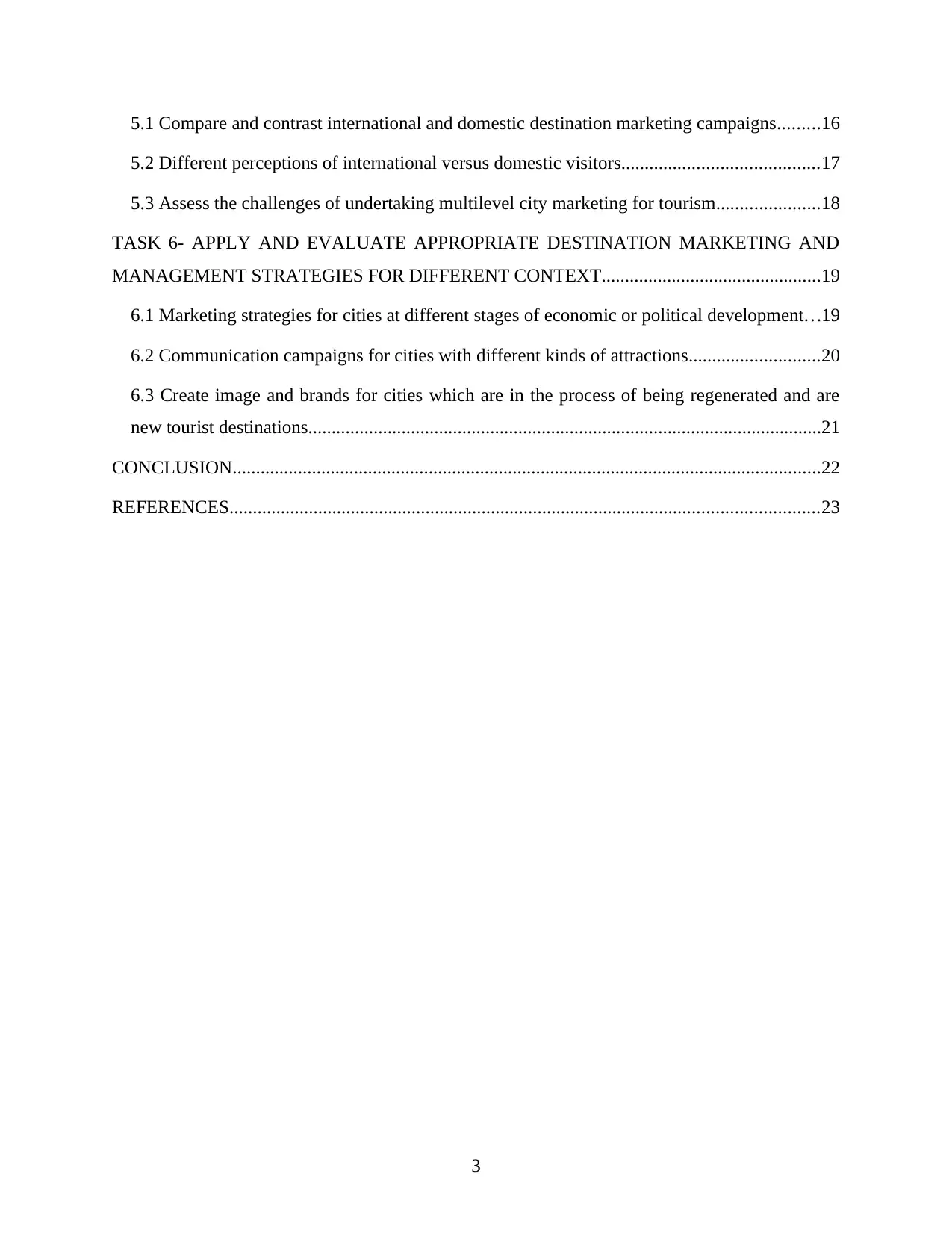
5.1 Compare and contrast international and domestic destination marketing campaigns.........16
5.2 Different perceptions of international versus domestic visitors..........................................17
5.3 Assess the challenges of undertaking multilevel city marketing for tourism......................18
TASK 6- APPLY AND EVALUATE APPROPRIATE DESTINATION MARKETING AND
MANAGEMENT STRATEGIES FOR DIFFERENT CONTEXT...............................................19
6.1 Marketing strategies for cities at different stages of economic or political development...19
6.2 Communication campaigns for cities with different kinds of attractions............................20
6.3 Create image and brands for cities which are in the process of being regenerated and are
new tourist destinations..............................................................................................................21
CONCLUSION..............................................................................................................................22
REFERENCES..............................................................................................................................23
3
5.2 Different perceptions of international versus domestic visitors..........................................17
5.3 Assess the challenges of undertaking multilevel city marketing for tourism......................18
TASK 6- APPLY AND EVALUATE APPROPRIATE DESTINATION MARKETING AND
MANAGEMENT STRATEGIES FOR DIFFERENT CONTEXT...............................................19
6.1 Marketing strategies for cities at different stages of economic or political development...19
6.2 Communication campaigns for cities with different kinds of attractions............................20
6.3 Create image and brands for cities which are in the process of being regenerated and are
new tourist destinations..............................................................................................................21
CONCLUSION..............................................................................................................................22
REFERENCES..............................................................................................................................23
3
⊘ This is a preview!⊘
Do you want full access?
Subscribe today to unlock all pages.

Trusted by 1+ million students worldwide
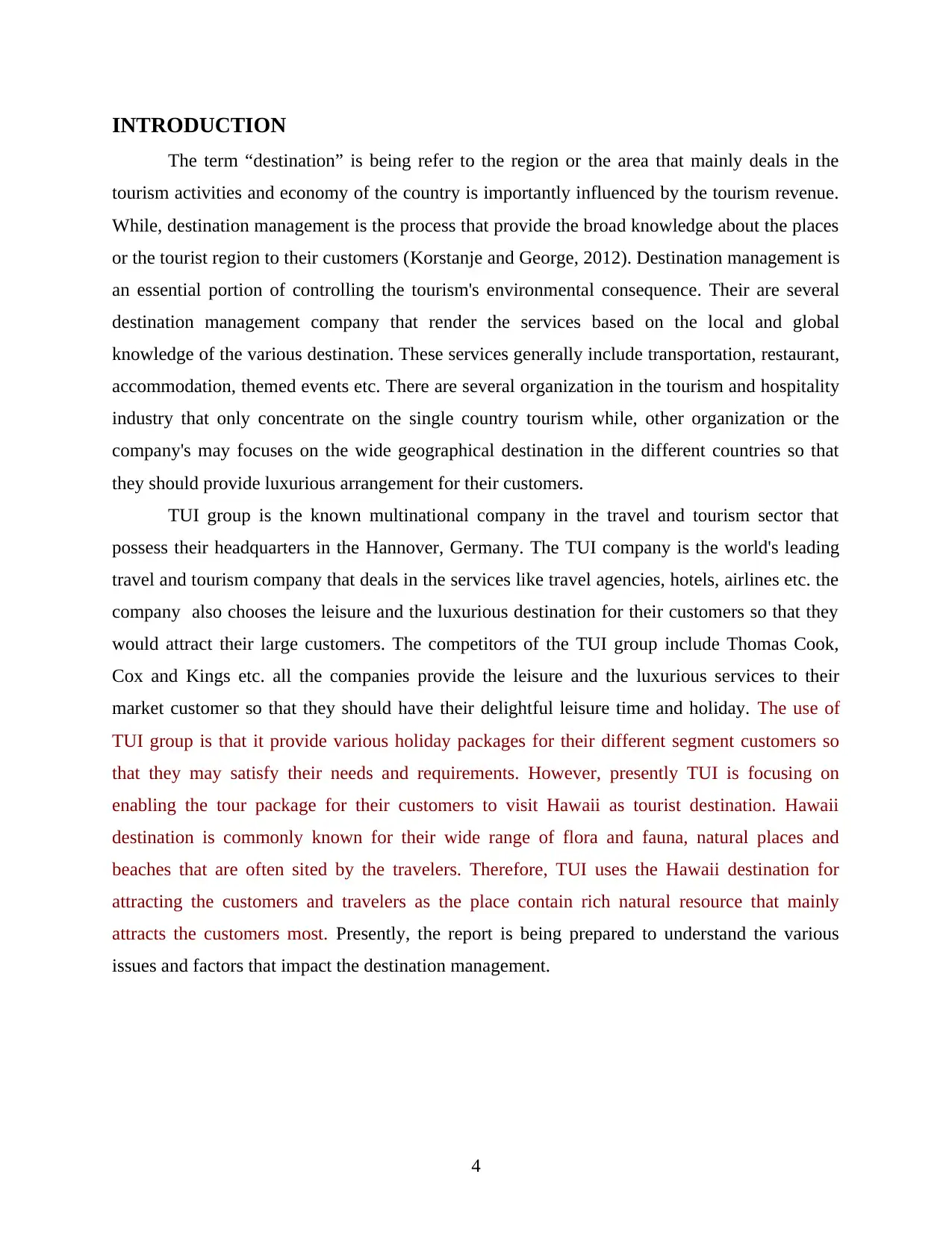
INTRODUCTION
The term “destination” is being refer to the region or the area that mainly deals in the
tourism activities and economy of the country is importantly influenced by the tourism revenue.
While, destination management is the process that provide the broad knowledge about the places
or the tourist region to their customers (Korstanje and George, 2012). Destination management is
an essential portion of controlling the tourism's environmental consequence. Their are several
destination management company that render the services based on the local and global
knowledge of the various destination. These services generally include transportation, restaurant,
accommodation, themed events etc. There are several organization in the tourism and hospitality
industry that only concentrate on the single country tourism while, other organization or the
company's may focuses on the wide geographical destination in the different countries so that
they should provide luxurious arrangement for their customers.
TUI group is the known multinational company in the travel and tourism sector that
possess their headquarters in the Hannover, Germany. The TUI company is the world's leading
travel and tourism company that deals in the services like travel agencies, hotels, airlines etc. the
company also chooses the leisure and the luxurious destination for their customers so that they
would attract their large customers. The competitors of the TUI group include Thomas Cook,
Cox and Kings etc. all the companies provide the leisure and the luxurious services to their
market customer so that they should have their delightful leisure time and holiday. The use of
TUI group is that it provide various holiday packages for their different segment customers so
that they may satisfy their needs and requirements. However, presently TUI is focusing on
enabling the tour package for their customers to visit Hawaii as tourist destination. Hawaii
destination is commonly known for their wide range of flora and fauna, natural places and
beaches that are often sited by the travelers. Therefore, TUI uses the Hawaii destination for
attracting the customers and travelers as the place contain rich natural resource that mainly
attracts the customers most. Presently, the report is being prepared to understand the various
issues and factors that impact the destination management.
4
The term “destination” is being refer to the region or the area that mainly deals in the
tourism activities and economy of the country is importantly influenced by the tourism revenue.
While, destination management is the process that provide the broad knowledge about the places
or the tourist region to their customers (Korstanje and George, 2012). Destination management is
an essential portion of controlling the tourism's environmental consequence. Their are several
destination management company that render the services based on the local and global
knowledge of the various destination. These services generally include transportation, restaurant,
accommodation, themed events etc. There are several organization in the tourism and hospitality
industry that only concentrate on the single country tourism while, other organization or the
company's may focuses on the wide geographical destination in the different countries so that
they should provide luxurious arrangement for their customers.
TUI group is the known multinational company in the travel and tourism sector that
possess their headquarters in the Hannover, Germany. The TUI company is the world's leading
travel and tourism company that deals in the services like travel agencies, hotels, airlines etc. the
company also chooses the leisure and the luxurious destination for their customers so that they
would attract their large customers. The competitors of the TUI group include Thomas Cook,
Cox and Kings etc. all the companies provide the leisure and the luxurious services to their
market customer so that they should have their delightful leisure time and holiday. The use of
TUI group is that it provide various holiday packages for their different segment customers so
that they may satisfy their needs and requirements. However, presently TUI is focusing on
enabling the tour package for their customers to visit Hawaii as tourist destination. Hawaii
destination is commonly known for their wide range of flora and fauna, natural places and
beaches that are often sited by the travelers. Therefore, TUI uses the Hawaii destination for
attracting the customers and travelers as the place contain rich natural resource that mainly
attracts the customers most. Presently, the report is being prepared to understand the various
issues and factors that impact the destination management.
4
Paraphrase This Document
Need a fresh take? Get an instant paraphrase of this document with our AI Paraphraser
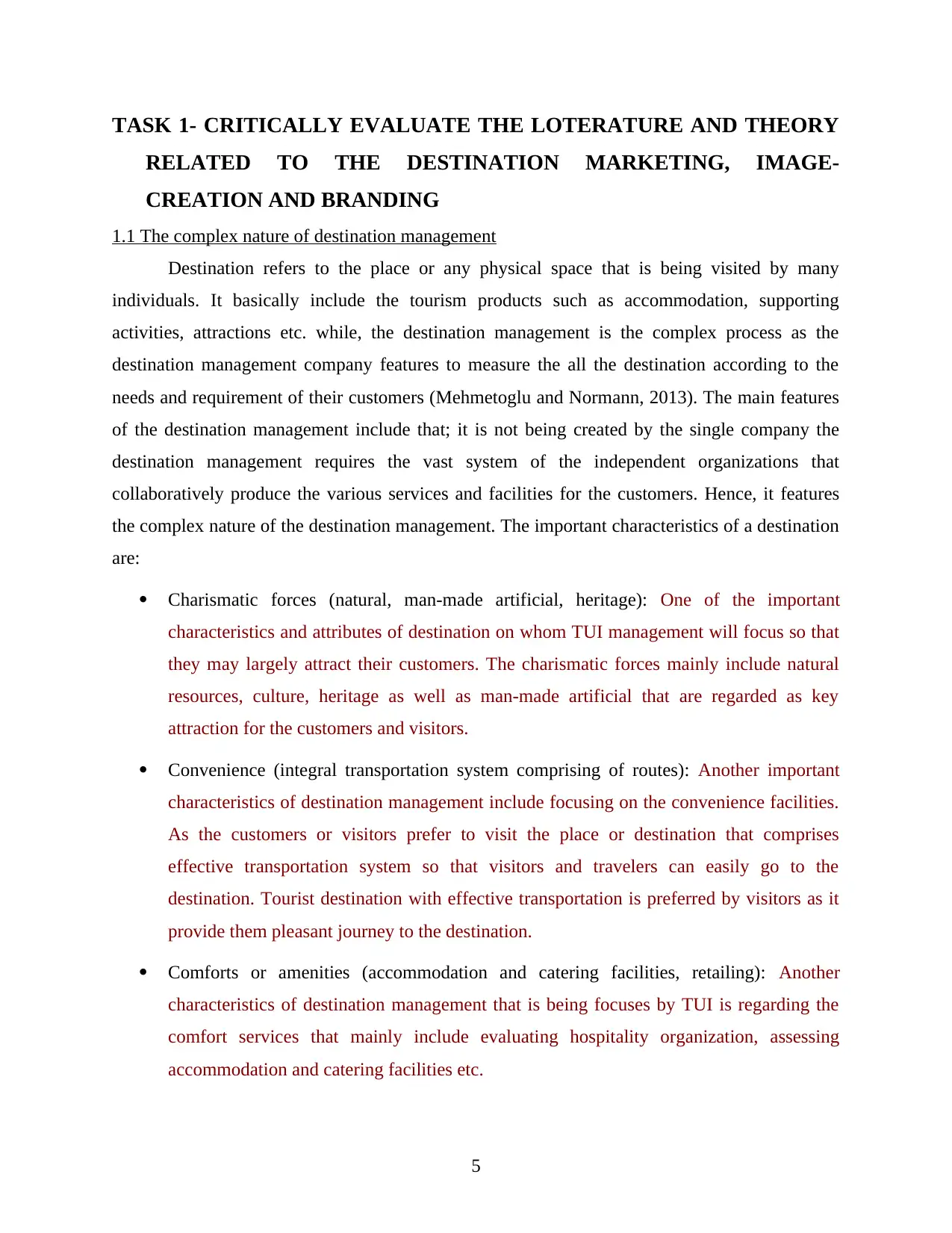
TASK 1- CRITICALLY EVALUATE THE LOTERATURE AND THEORY
RELATED TO THE DESTINATION MARKETING, IMAGE-
CREATION AND BRANDING
1.1 The complex nature of destination management
Destination refers to the place or any physical space that is being visited by many
individuals. It basically include the tourism products such as accommodation, supporting
activities, attractions etc. while, the destination management is the complex process as the
destination management company features to measure the all the destination according to the
needs and requirement of their customers (Mehmetoglu and Normann, 2013). The main features
of the destination management include that; it is not being created by the single company the
destination management requires the vast system of the independent organizations that
collaboratively produce the various services and facilities for the customers. Hence, it features
the complex nature of the destination management. The important characteristics of a destination
are:
Charismatic forces (natural, man-made artificial, heritage): One of the important
characteristics and attributes of destination on whom TUI management will focus so that
they may largely attract their customers. The charismatic forces mainly include natural
resources, culture, heritage as well as man-made artificial that are regarded as key
attraction for the customers and visitors.
Convenience (integral transportation system comprising of routes): Another important
characteristics of destination management include focusing on the convenience facilities.
As the customers or visitors prefer to visit the place or destination that comprises
effective transportation system so that visitors and travelers can easily go to the
destination. Tourist destination with effective transportation is preferred by visitors as it
provide them pleasant journey to the destination.
Comforts or amenities (accommodation and catering facilities, retailing): Another
characteristics of destination management that is being focuses by TUI is regarding the
comfort services that mainly include evaluating hospitality organization, assessing
accommodation and catering facilities etc.
5
RELATED TO THE DESTINATION MARKETING, IMAGE-
CREATION AND BRANDING
1.1 The complex nature of destination management
Destination refers to the place or any physical space that is being visited by many
individuals. It basically include the tourism products such as accommodation, supporting
activities, attractions etc. while, the destination management is the complex process as the
destination management company features to measure the all the destination according to the
needs and requirement of their customers (Mehmetoglu and Normann, 2013). The main features
of the destination management include that; it is not being created by the single company the
destination management requires the vast system of the independent organizations that
collaboratively produce the various services and facilities for the customers. Hence, it features
the complex nature of the destination management. The important characteristics of a destination
are:
Charismatic forces (natural, man-made artificial, heritage): One of the important
characteristics and attributes of destination on whom TUI management will focus so that
they may largely attract their customers. The charismatic forces mainly include natural
resources, culture, heritage as well as man-made artificial that are regarded as key
attraction for the customers and visitors.
Convenience (integral transportation system comprising of routes): Another important
characteristics of destination management include focusing on the convenience facilities.
As the customers or visitors prefer to visit the place or destination that comprises
effective transportation system so that visitors and travelers can easily go to the
destination. Tourist destination with effective transportation is preferred by visitors as it
provide them pleasant journey to the destination.
Comforts or amenities (accommodation and catering facilities, retailing): Another
characteristics of destination management that is being focuses by TUI is regarding the
comfort services that mainly include evaluating hospitality organization, assessing
accommodation and catering facilities etc.
5
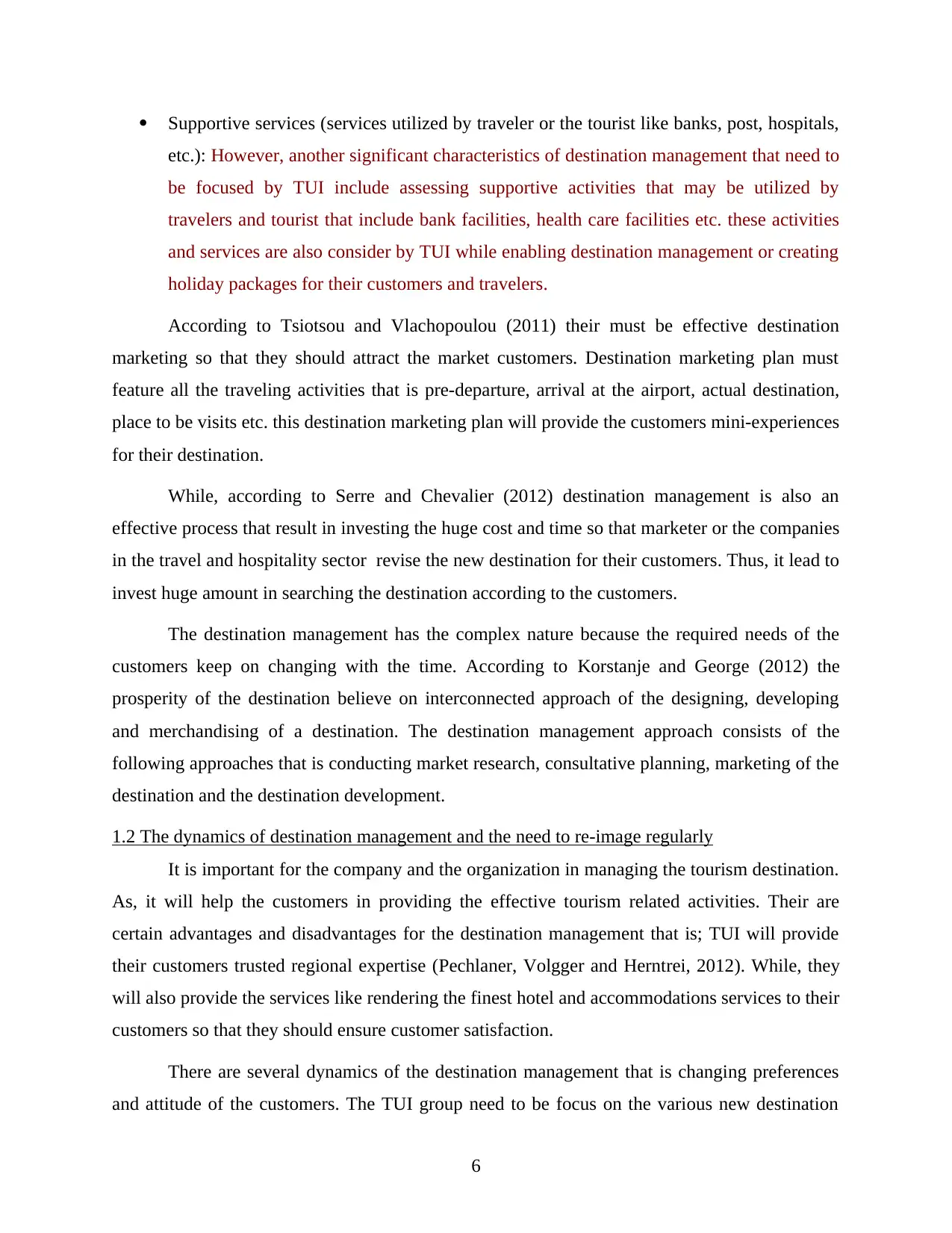
Supportive services (services utilized by traveler or the tourist like banks, post, hospitals,
etc.): However, another significant characteristics of destination management that need to
be focused by TUI include assessing supportive activities that may be utilized by
travelers and tourist that include bank facilities, health care facilities etc. these activities
and services are also consider by TUI while enabling destination management or creating
holiday packages for their customers and travelers.
According to Tsiotsou and Vlachopoulou (2011) their must be effective destination
marketing so that they should attract the market customers. Destination marketing plan must
feature all the traveling activities that is pre-departure, arrival at the airport, actual destination,
place to be visits etc. this destination marketing plan will provide the customers mini-experiences
for their destination.
While, according to Serre and Chevalier (2012) destination management is also an
effective process that result in investing the huge cost and time so that marketer or the companies
in the travel and hospitality sector revise the new destination for their customers. Thus, it lead to
invest huge amount in searching the destination according to the customers.
The destination management has the complex nature because the required needs of the
customers keep on changing with the time. According to Korstanje and George (2012) the
prosperity of the destination believe on interconnected approach of the designing, developing
and merchandising of a destination. The destination management approach consists of the
following approaches that is conducting market research, consultative planning, marketing of the
destination and the destination development.
1.2 The dynamics of destination management and the need to re-image regularly
It is important for the company and the organization in managing the tourism destination.
As, it will help the customers in providing the effective tourism related activities. Their are
certain advantages and disadvantages for the destination management that is; TUI will provide
their customers trusted regional expertise (Pechlaner, Volgger and Herntrei, 2012). While, they
will also provide the services like rendering the finest hotel and accommodations services to their
customers so that they should ensure customer satisfaction.
There are several dynamics of the destination management that is changing preferences
and attitude of the customers. The TUI group need to be focus on the various new destination
6
etc.): However, another significant characteristics of destination management that need to
be focused by TUI include assessing supportive activities that may be utilized by
travelers and tourist that include bank facilities, health care facilities etc. these activities
and services are also consider by TUI while enabling destination management or creating
holiday packages for their customers and travelers.
According to Tsiotsou and Vlachopoulou (2011) their must be effective destination
marketing so that they should attract the market customers. Destination marketing plan must
feature all the traveling activities that is pre-departure, arrival at the airport, actual destination,
place to be visits etc. this destination marketing plan will provide the customers mini-experiences
for their destination.
While, according to Serre and Chevalier (2012) destination management is also an
effective process that result in investing the huge cost and time so that marketer or the companies
in the travel and hospitality sector revise the new destination for their customers. Thus, it lead to
invest huge amount in searching the destination according to the customers.
The destination management has the complex nature because the required needs of the
customers keep on changing with the time. According to Korstanje and George (2012) the
prosperity of the destination believe on interconnected approach of the designing, developing
and merchandising of a destination. The destination management approach consists of the
following approaches that is conducting market research, consultative planning, marketing of the
destination and the destination development.
1.2 The dynamics of destination management and the need to re-image regularly
It is important for the company and the organization in managing the tourism destination.
As, it will help the customers in providing the effective tourism related activities. Their are
certain advantages and disadvantages for the destination management that is; TUI will provide
their customers trusted regional expertise (Pechlaner, Volgger and Herntrei, 2012). While, they
will also provide the services like rendering the finest hotel and accommodations services to their
customers so that they should ensure customer satisfaction.
There are several dynamics of the destination management that is changing preferences
and attitude of the customers. The TUI group need to be focus on the various new destination
6
⊘ This is a preview!⊘
Do you want full access?
Subscribe today to unlock all pages.

Trusted by 1+ million students worldwide
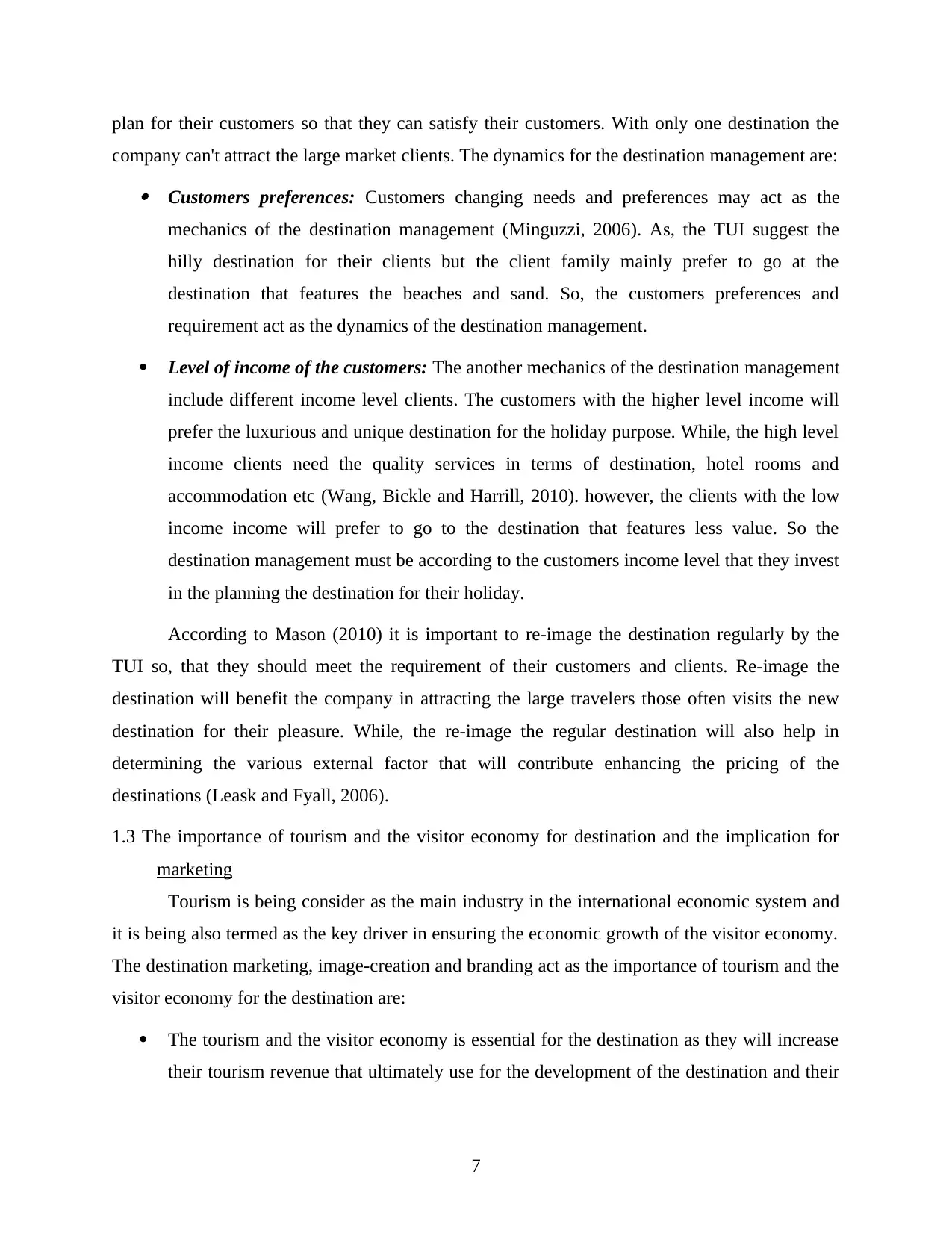
plan for their customers so that they can satisfy their customers. With only one destination the
company can't attract the large market clients. The dynamics for the destination management are: Customers preferences: Customers changing needs and preferences may act as the
mechanics of the destination management (Minguzzi, 2006). As, the TUI suggest the
hilly destination for their clients but the client family mainly prefer to go at the
destination that features the beaches and sand. So, the customers preferences and
requirement act as the dynamics of the destination management.
Level of income of the customers: The another mechanics of the destination management
include different income level clients. The customers with the higher level income will
prefer the luxurious and unique destination for the holiday purpose. While, the high level
income clients need the quality services in terms of destination, hotel rooms and
accommodation etc (Wang, Bickle and Harrill, 2010). however, the clients with the low
income income will prefer to go to the destination that features less value. So the
destination management must be according to the customers income level that they invest
in the planning the destination for their holiday.
According to Mason (2010) it is important to re-image the destination regularly by the
TUI so, that they should meet the requirement of their customers and clients. Re-image the
destination will benefit the company in attracting the large travelers those often visits the new
destination for their pleasure. While, the re-image the regular destination will also help in
determining the various external factor that will contribute enhancing the pricing of the
destinations (Leask and Fyall, 2006).
1.3 The importance of tourism and the visitor economy for destination and the implication for
marketing
Tourism is being consider as the main industry in the international economic system and
it is being also termed as the key driver in ensuring the economic growth of the visitor economy.
The destination marketing, image-creation and branding act as the importance of tourism and the
visitor economy for the destination are:
The tourism and the visitor economy is essential for the destination as they will increase
their tourism revenue that ultimately use for the development of the destination and their
7
company can't attract the large market clients. The dynamics for the destination management are: Customers preferences: Customers changing needs and preferences may act as the
mechanics of the destination management (Minguzzi, 2006). As, the TUI suggest the
hilly destination for their clients but the client family mainly prefer to go at the
destination that features the beaches and sand. So, the customers preferences and
requirement act as the dynamics of the destination management.
Level of income of the customers: The another mechanics of the destination management
include different income level clients. The customers with the higher level income will
prefer the luxurious and unique destination for the holiday purpose. While, the high level
income clients need the quality services in terms of destination, hotel rooms and
accommodation etc (Wang, Bickle and Harrill, 2010). however, the clients with the low
income income will prefer to go to the destination that features less value. So the
destination management must be according to the customers income level that they invest
in the planning the destination for their holiday.
According to Mason (2010) it is important to re-image the destination regularly by the
TUI so, that they should meet the requirement of their customers and clients. Re-image the
destination will benefit the company in attracting the large travelers those often visits the new
destination for their pleasure. While, the re-image the regular destination will also help in
determining the various external factor that will contribute enhancing the pricing of the
destinations (Leask and Fyall, 2006).
1.3 The importance of tourism and the visitor economy for destination and the implication for
marketing
Tourism is being consider as the main industry in the international economic system and
it is being also termed as the key driver in ensuring the economic growth of the visitor economy.
The destination marketing, image-creation and branding act as the importance of tourism and the
visitor economy for the destination are:
The tourism and the visitor economy is essential for the destination as they will increase
their tourism revenue that ultimately use for the development of the destination and their
7
Paraphrase This Document
Need a fresh take? Get an instant paraphrase of this document with our AI Paraphraser
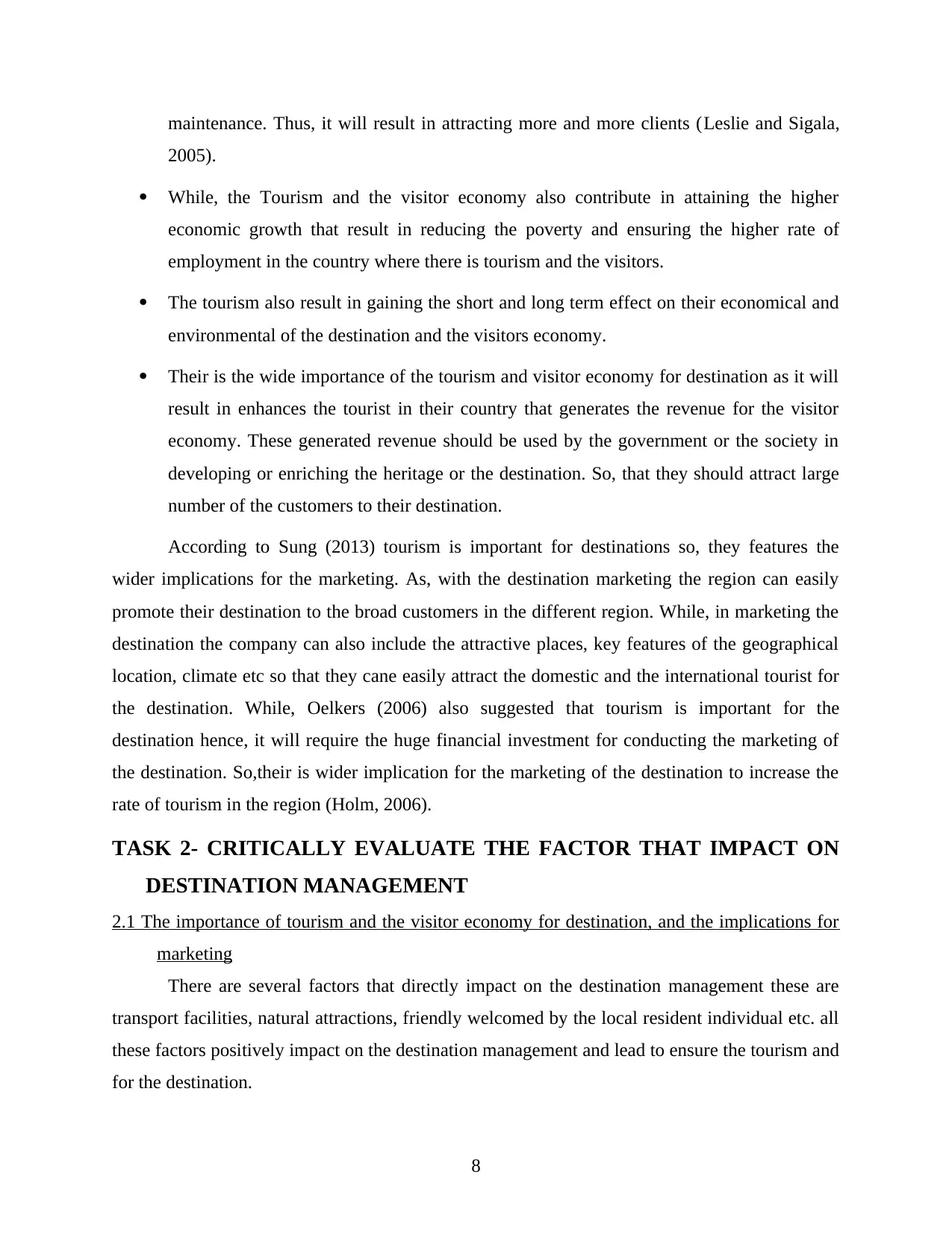
maintenance. Thus, it will result in attracting more and more clients (Leslie and Sigala,
2005).
While, the Tourism and the visitor economy also contribute in attaining the higher
economic growth that result in reducing the poverty and ensuring the higher rate of
employment in the country where there is tourism and the visitors.
The tourism also result in gaining the short and long term effect on their economical and
environmental of the destination and the visitors economy.
Their is the wide importance of the tourism and visitor economy for destination as it will
result in enhances the tourist in their country that generates the revenue for the visitor
economy. These generated revenue should be used by the government or the society in
developing or enriching the heritage or the destination. So, that they should attract large
number of the customers to their destination.
According to Sung (2013) tourism is important for destinations so, they features the
wider implications for the marketing. As, with the destination marketing the region can easily
promote their destination to the broad customers in the different region. While, in marketing the
destination the company can also include the attractive places, key features of the geographical
location, climate etc so that they cane easily attract the domestic and the international tourist for
the destination. While, Oelkers (2006) also suggested that tourism is important for the
destination hence, it will require the huge financial investment for conducting the marketing of
the destination. So,their is wider implication for the marketing of the destination to increase the
rate of tourism in the region (Holm, 2006).
TASK 2- CRITICALLY EVALUATE THE FACTOR THAT IMPACT ON
DESTINATION MANAGEMENT
2.1 The importance of tourism and the visitor economy for destination, and the implications for
marketing
There are several factors that directly impact on the destination management these are
transport facilities, natural attractions, friendly welcomed by the local resident individual etc. all
these factors positively impact on the destination management and lead to ensure the tourism and
for the destination.
8
2005).
While, the Tourism and the visitor economy also contribute in attaining the higher
economic growth that result in reducing the poverty and ensuring the higher rate of
employment in the country where there is tourism and the visitors.
The tourism also result in gaining the short and long term effect on their economical and
environmental of the destination and the visitors economy.
Their is the wide importance of the tourism and visitor economy for destination as it will
result in enhances the tourist in their country that generates the revenue for the visitor
economy. These generated revenue should be used by the government or the society in
developing or enriching the heritage or the destination. So, that they should attract large
number of the customers to their destination.
According to Sung (2013) tourism is important for destinations so, they features the
wider implications for the marketing. As, with the destination marketing the region can easily
promote their destination to the broad customers in the different region. While, in marketing the
destination the company can also include the attractive places, key features of the geographical
location, climate etc so that they cane easily attract the domestic and the international tourist for
the destination. While, Oelkers (2006) also suggested that tourism is important for the
destination hence, it will require the huge financial investment for conducting the marketing of
the destination. So,their is wider implication for the marketing of the destination to increase the
rate of tourism in the region (Holm, 2006).
TASK 2- CRITICALLY EVALUATE THE FACTOR THAT IMPACT ON
DESTINATION MANAGEMENT
2.1 The importance of tourism and the visitor economy for destination, and the implications for
marketing
There are several factors that directly impact on the destination management these are
transport facilities, natural attractions, friendly welcomed by the local resident individual etc. all
these factors positively impact on the destination management and lead to ensure the tourism and
for the destination.
8
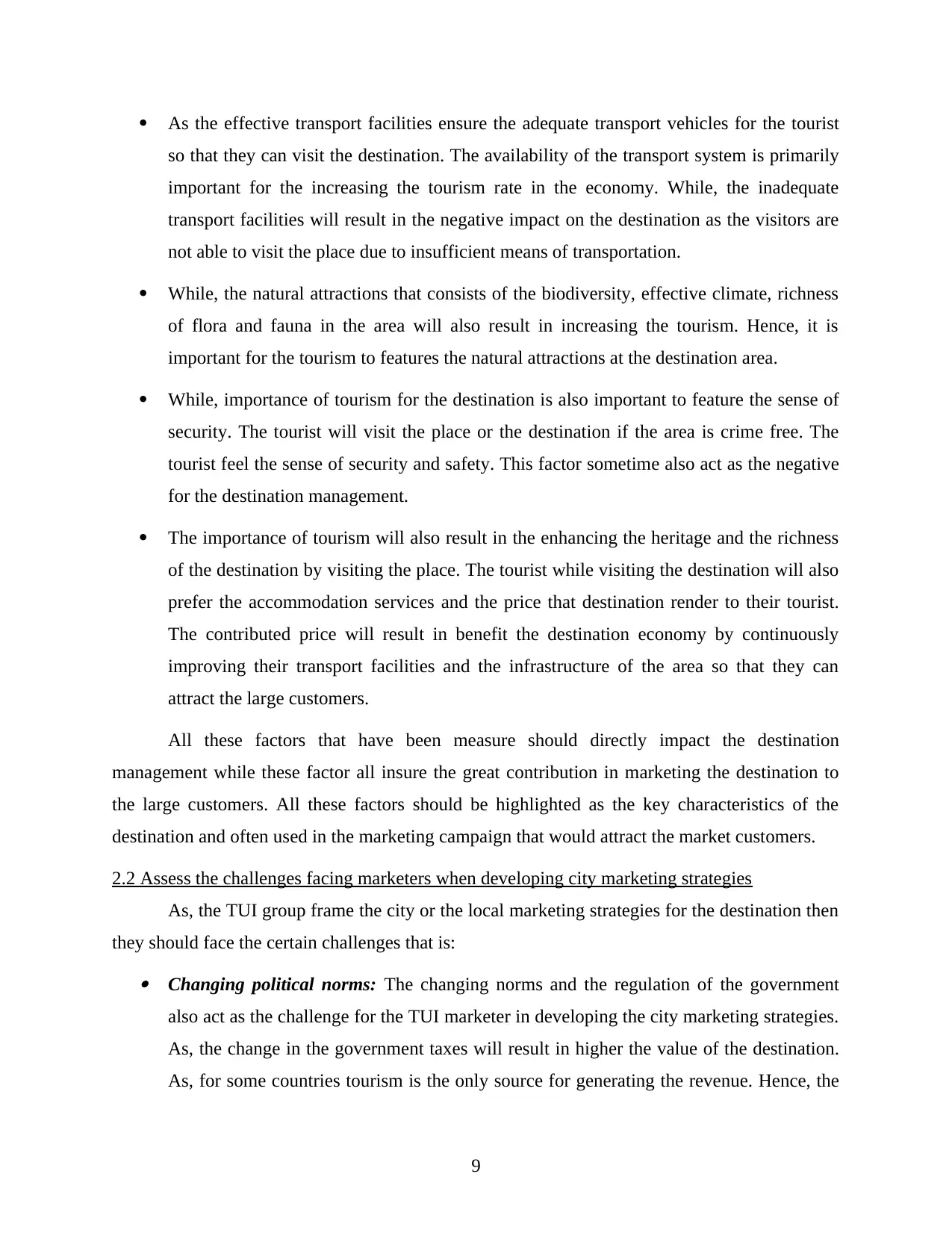
As the effective transport facilities ensure the adequate transport vehicles for the tourist
so that they can visit the destination. The availability of the transport system is primarily
important for the increasing the tourism rate in the economy. While, the inadequate
transport facilities will result in the negative impact on the destination as the visitors are
not able to visit the place due to insufficient means of transportation.
While, the natural attractions that consists of the biodiversity, effective climate, richness
of flora and fauna in the area will also result in increasing the tourism. Hence, it is
important for the tourism to features the natural attractions at the destination area.
While, importance of tourism for the destination is also important to feature the sense of
security. The tourist will visit the place or the destination if the area is crime free. The
tourist feel the sense of security and safety. This factor sometime also act as the negative
for the destination management.
The importance of tourism will also result in the enhancing the heritage and the richness
of the destination by visiting the place. The tourist while visiting the destination will also
prefer the accommodation services and the price that destination render to their tourist.
The contributed price will result in benefit the destination economy by continuously
improving their transport facilities and the infrastructure of the area so that they can
attract the large customers.
All these factors that have been measure should directly impact the destination
management while these factor all insure the great contribution in marketing the destination to
the large customers. All these factors should be highlighted as the key characteristics of the
destination and often used in the marketing campaign that would attract the market customers.
2.2 Assess the challenges facing marketers when developing city marketing strategies
As, the TUI group frame the city or the local marketing strategies for the destination then
they should face the certain challenges that is: Changing political norms: The changing norms and the regulation of the government
also act as the challenge for the TUI marketer in developing the city marketing strategies.
As, the change in the government taxes will result in higher the value of the destination.
As, for some countries tourism is the only source for generating the revenue. Hence, the
9
so that they can visit the destination. The availability of the transport system is primarily
important for the increasing the tourism rate in the economy. While, the inadequate
transport facilities will result in the negative impact on the destination as the visitors are
not able to visit the place due to insufficient means of transportation.
While, the natural attractions that consists of the biodiversity, effective climate, richness
of flora and fauna in the area will also result in increasing the tourism. Hence, it is
important for the tourism to features the natural attractions at the destination area.
While, importance of tourism for the destination is also important to feature the sense of
security. The tourist will visit the place or the destination if the area is crime free. The
tourist feel the sense of security and safety. This factor sometime also act as the negative
for the destination management.
The importance of tourism will also result in the enhancing the heritage and the richness
of the destination by visiting the place. The tourist while visiting the destination will also
prefer the accommodation services and the price that destination render to their tourist.
The contributed price will result in benefit the destination economy by continuously
improving their transport facilities and the infrastructure of the area so that they can
attract the large customers.
All these factors that have been measure should directly impact the destination
management while these factor all insure the great contribution in marketing the destination to
the large customers. All these factors should be highlighted as the key characteristics of the
destination and often used in the marketing campaign that would attract the market customers.
2.2 Assess the challenges facing marketers when developing city marketing strategies
As, the TUI group frame the city or the local marketing strategies for the destination then
they should face the certain challenges that is: Changing political norms: The changing norms and the regulation of the government
also act as the challenge for the TUI marketer in developing the city marketing strategies.
As, the change in the government taxes will result in higher the value of the destination.
As, for some countries tourism is the only source for generating the revenue. Hence, the
9
⊘ This is a preview!⊘
Do you want full access?
Subscribe today to unlock all pages.

Trusted by 1+ million students worldwide
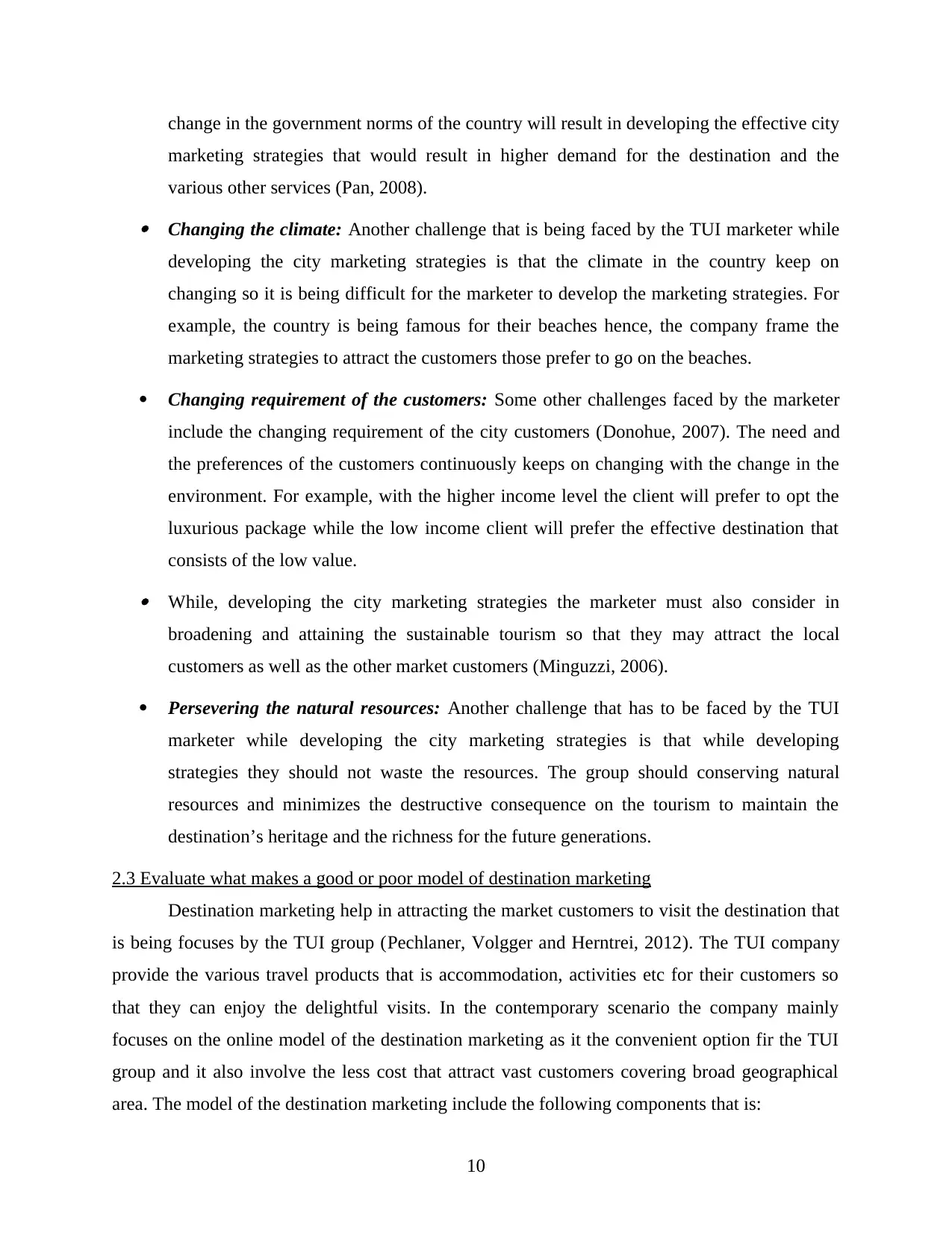
change in the government norms of the country will result in developing the effective city
marketing strategies that would result in higher demand for the destination and the
various other services (Pan, 2008). Changing the climate: Another challenge that is being faced by the TUI marketer while
developing the city marketing strategies is that the climate in the country keep on
changing so it is being difficult for the marketer to develop the marketing strategies. For
example, the country is being famous for their beaches hence, the company frame the
marketing strategies to attract the customers those prefer to go on the beaches.
Changing requirement of the customers: Some other challenges faced by the marketer
include the changing requirement of the city customers (Donohue, 2007). The need and
the preferences of the customers continuously keeps on changing with the change in the
environment. For example, with the higher income level the client will prefer to opt the
luxurious package while the low income client will prefer the effective destination that
consists of the low value. While, developing the city marketing strategies the marketer must also consider in
broadening and attaining the sustainable tourism so that they may attract the local
customers as well as the other market customers (Minguzzi, 2006).
Persevering the natural resources: Another challenge that has to be faced by the TUI
marketer while developing the city marketing strategies is that while developing
strategies they should not waste the resources. The group should conserving natural
resources and minimizes the destructive consequence on the tourism to maintain the
destination’s heritage and the richness for the future generations.
2.3 Evaluate what makes a good or poor model of destination marketing
Destination marketing help in attracting the market customers to visit the destination that
is being focuses by the TUI group (Pechlaner, Volgger and Herntrei, 2012). The TUI company
provide the various travel products that is accommodation, activities etc for their customers so
that they can enjoy the delightful visits. In the contemporary scenario the company mainly
focuses on the online model of the destination marketing as it the convenient option fir the TUI
group and it also involve the less cost that attract vast customers covering broad geographical
area. The model of the destination marketing include the following components that is:
10
marketing strategies that would result in higher demand for the destination and the
various other services (Pan, 2008). Changing the climate: Another challenge that is being faced by the TUI marketer while
developing the city marketing strategies is that the climate in the country keep on
changing so it is being difficult for the marketer to develop the marketing strategies. For
example, the country is being famous for their beaches hence, the company frame the
marketing strategies to attract the customers those prefer to go on the beaches.
Changing requirement of the customers: Some other challenges faced by the marketer
include the changing requirement of the city customers (Donohue, 2007). The need and
the preferences of the customers continuously keeps on changing with the change in the
environment. For example, with the higher income level the client will prefer to opt the
luxurious package while the low income client will prefer the effective destination that
consists of the low value. While, developing the city marketing strategies the marketer must also consider in
broadening and attaining the sustainable tourism so that they may attract the local
customers as well as the other market customers (Minguzzi, 2006).
Persevering the natural resources: Another challenge that has to be faced by the TUI
marketer while developing the city marketing strategies is that while developing
strategies they should not waste the resources. The group should conserving natural
resources and minimizes the destructive consequence on the tourism to maintain the
destination’s heritage and the richness for the future generations.
2.3 Evaluate what makes a good or poor model of destination marketing
Destination marketing help in attracting the market customers to visit the destination that
is being focuses by the TUI group (Pechlaner, Volgger and Herntrei, 2012). The TUI company
provide the various travel products that is accommodation, activities etc for their customers so
that they can enjoy the delightful visits. In the contemporary scenario the company mainly
focuses on the online model of the destination marketing as it the convenient option fir the TUI
group and it also involve the less cost that attract vast customers covering broad geographical
area. The model of the destination marketing include the following components that is:
10
Paraphrase This Document
Need a fresh take? Get an instant paraphrase of this document with our AI Paraphraser
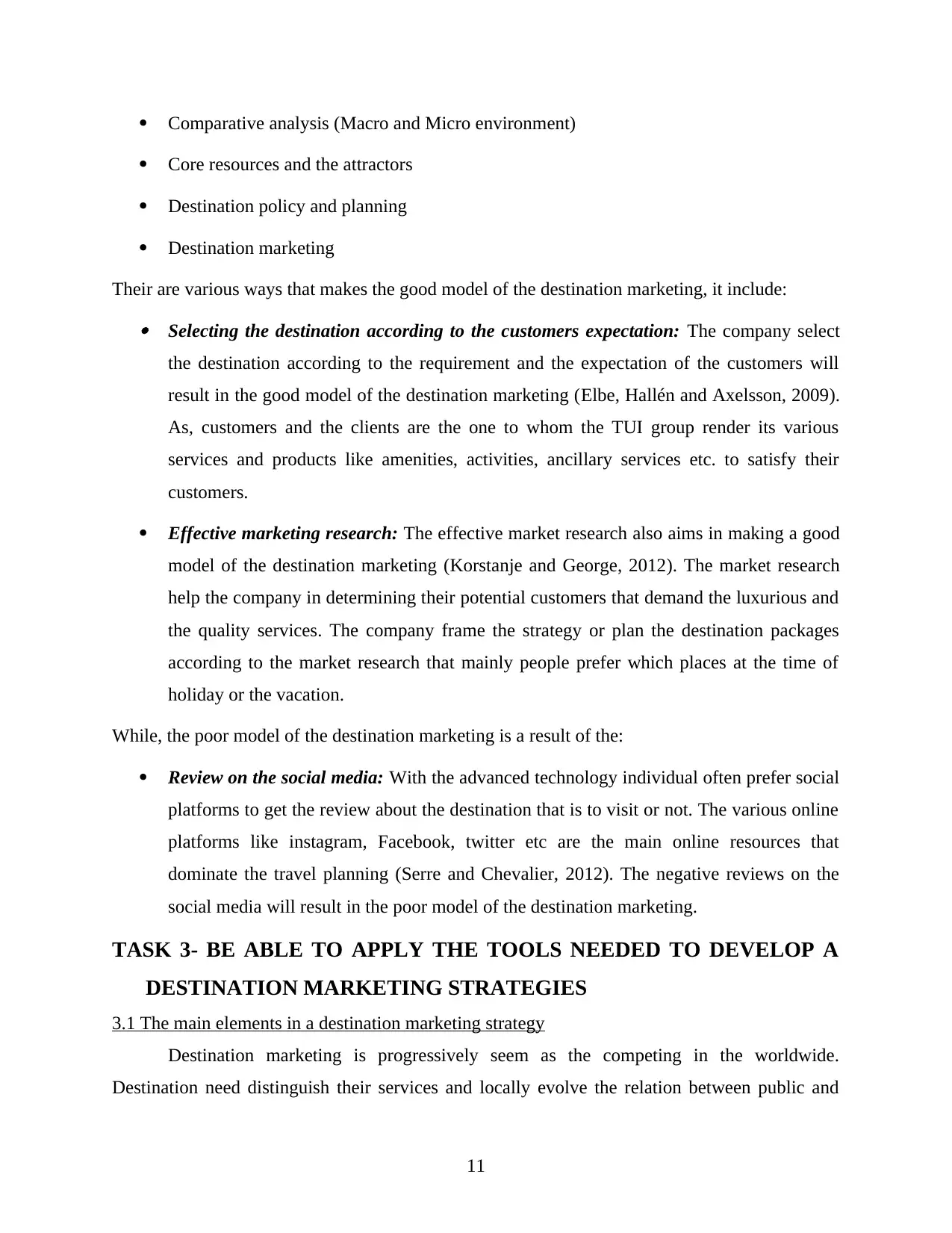
Comparative analysis (Macro and Micro environment)
Core resources and the attractors
Destination policy and planning
Destination marketing
Their are various ways that makes the good model of the destination marketing, it include: Selecting the destination according to the customers expectation: The company select
the destination according to the requirement and the expectation of the customers will
result in the good model of the destination marketing (Elbe, Hallén and Axelsson, 2009).
As, customers and the clients are the one to whom the TUI group render its various
services and products like amenities, activities, ancillary services etc. to satisfy their
customers.
Effective marketing research: The effective market research also aims in making a good
model of the destination marketing (Korstanje and George, 2012). The market research
help the company in determining their potential customers that demand the luxurious and
the quality services. The company frame the strategy or plan the destination packages
according to the market research that mainly people prefer which places at the time of
holiday or the vacation.
While, the poor model of the destination marketing is a result of the:
Review on the social media: With the advanced technology individual often prefer social
platforms to get the review about the destination that is to visit or not. The various online
platforms like instagram, Facebook, twitter etc are the main online resources that
dominate the travel planning (Serre and Chevalier, 2012). The negative reviews on the
social media will result in the poor model of the destination marketing.
TASK 3- BE ABLE TO APPLY THE TOOLS NEEDED TO DEVELOP A
DESTINATION MARKETING STRATEGIES
3.1 The main elements in a destination marketing strategy
Destination marketing is progressively seem as the competing in the worldwide.
Destination need distinguish their services and locally evolve the relation between public and
11
Core resources and the attractors
Destination policy and planning
Destination marketing
Their are various ways that makes the good model of the destination marketing, it include: Selecting the destination according to the customers expectation: The company select
the destination according to the requirement and the expectation of the customers will
result in the good model of the destination marketing (Elbe, Hallén and Axelsson, 2009).
As, customers and the clients are the one to whom the TUI group render its various
services and products like amenities, activities, ancillary services etc. to satisfy their
customers.
Effective marketing research: The effective market research also aims in making a good
model of the destination marketing (Korstanje and George, 2012). The market research
help the company in determining their potential customers that demand the luxurious and
the quality services. The company frame the strategy or plan the destination packages
according to the market research that mainly people prefer which places at the time of
holiday or the vacation.
While, the poor model of the destination marketing is a result of the:
Review on the social media: With the advanced technology individual often prefer social
platforms to get the review about the destination that is to visit or not. The various online
platforms like instagram, Facebook, twitter etc are the main online resources that
dominate the travel planning (Serre and Chevalier, 2012). The negative reviews on the
social media will result in the poor model of the destination marketing.
TASK 3- BE ABLE TO APPLY THE TOOLS NEEDED TO DEVELOP A
DESTINATION MARKETING STRATEGIES
3.1 The main elements in a destination marketing strategy
Destination marketing is progressively seem as the competing in the worldwide.
Destination need distinguish their services and locally evolve the relation between public and
11
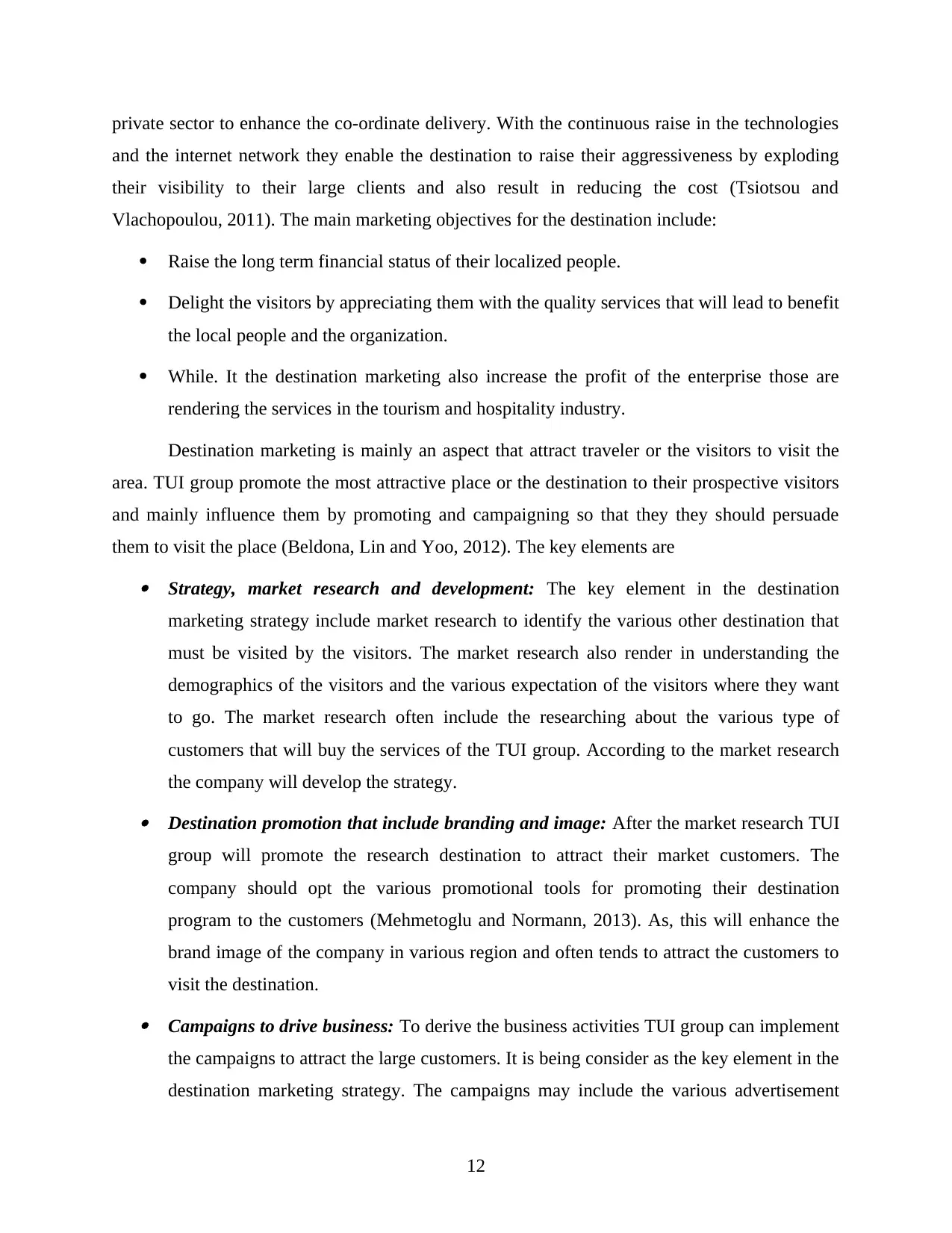
private sector to enhance the co-ordinate delivery. With the continuous raise in the technologies
and the internet network they enable the destination to raise their aggressiveness by exploding
their visibility to their large clients and also result in reducing the cost (Tsiotsou and
Vlachopoulou, 2011). The main marketing objectives for the destination include:
Raise the long term financial status of their localized people.
Delight the visitors by appreciating them with the quality services that will lead to benefit
the local people and the organization.
While. It the destination marketing also increase the profit of the enterprise those are
rendering the services in the tourism and hospitality industry.
Destination marketing is mainly an aspect that attract traveler or the visitors to visit the
area. TUI group promote the most attractive place or the destination to their prospective visitors
and mainly influence them by promoting and campaigning so that they they should persuade
them to visit the place (Beldona, Lin and Yoo, 2012). The key elements are Strategy, market research and development: The key element in the destination
marketing strategy include market research to identify the various other destination that
must be visited by the visitors. The market research also render in understanding the
demographics of the visitors and the various expectation of the visitors where they want
to go. The market research often include the researching about the various type of
customers that will buy the services of the TUI group. According to the market research
the company will develop the strategy. Destination promotion that include branding and image: After the market research TUI
group will promote the research destination to attract their market customers. The
company should opt the various promotional tools for promoting their destination
program to the customers (Mehmetoglu and Normann, 2013). As, this will enhance the
brand image of the company in various region and often tends to attract the customers to
visit the destination. Campaigns to drive business: To derive the business activities TUI group can implement
the campaigns to attract the large customers. It is being consider as the key element in the
destination marketing strategy. The campaigns may include the various advertisement
12
and the internet network they enable the destination to raise their aggressiveness by exploding
their visibility to their large clients and also result in reducing the cost (Tsiotsou and
Vlachopoulou, 2011). The main marketing objectives for the destination include:
Raise the long term financial status of their localized people.
Delight the visitors by appreciating them with the quality services that will lead to benefit
the local people and the organization.
While. It the destination marketing also increase the profit of the enterprise those are
rendering the services in the tourism and hospitality industry.
Destination marketing is mainly an aspect that attract traveler or the visitors to visit the
area. TUI group promote the most attractive place or the destination to their prospective visitors
and mainly influence them by promoting and campaigning so that they they should persuade
them to visit the place (Beldona, Lin and Yoo, 2012). The key elements are Strategy, market research and development: The key element in the destination
marketing strategy include market research to identify the various other destination that
must be visited by the visitors. The market research also render in understanding the
demographics of the visitors and the various expectation of the visitors where they want
to go. The market research often include the researching about the various type of
customers that will buy the services of the TUI group. According to the market research
the company will develop the strategy. Destination promotion that include branding and image: After the market research TUI
group will promote the research destination to attract their market customers. The
company should opt the various promotional tools for promoting their destination
program to the customers (Mehmetoglu and Normann, 2013). As, this will enhance the
brand image of the company in various region and often tends to attract the customers to
visit the destination. Campaigns to drive business: To derive the business activities TUI group can implement
the campaigns to attract the large customers. It is being consider as the key element in the
destination marketing strategy. The campaigns may include the various advertisement
12
⊘ This is a preview!⊘
Do you want full access?
Subscribe today to unlock all pages.

Trusted by 1+ million students worldwide
1 out of 26
Related Documents
Your All-in-One AI-Powered Toolkit for Academic Success.
+13062052269
info@desklib.com
Available 24*7 on WhatsApp / Email
![[object Object]](/_next/static/media/star-bottom.7253800d.svg)
Unlock your academic potential
Copyright © 2020–2026 A2Z Services. All Rights Reserved. Developed and managed by ZUCOL.





